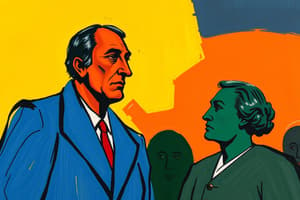Podcast
Questions and Answers
In Schenck v. United States, what legal standard did the Supreme Court establish concerning the limits of free speech?
In Schenck v. United States, what legal standard did the Supreme Court establish concerning the limits of free speech?
- The 'clear and present danger' test, limiting speech that poses an immediate threat. (correct)
- The 'strict scrutiny' test, requiring a compelling government interest.
- The 'undue burden' standard, prohibiting laws that place a substantial obstacle to speech.
- The 'balancing test', weighing the individual's right to speech against government interests.
How did Justice Holmes' dissenting opinion in Lochner v. New York differ from the majority opinion?
How did Justice Holmes' dissenting opinion in Lochner v. New York differ from the majority opinion?
- Holmes supported the bakeshop law to protect business owners, while the majority aimed to reduce government interference.
- Holmes argued that the government had the right to regulate work hours for public health, while the majority favored freedom of contract. (correct)
- Holmes believed the 14th amendment protected individual economic rights absolutely, while the majority saw some limits.
- Holmes claimed that the constitution should not regulate contracts, The Courts should let business owners do what they want.
What was the central argument presented by Elsie Parrish in West Coast Hotel Co. v. Parrish?
What was the central argument presented by Elsie Parrish in West Coast Hotel Co. v. Parrish?
- That minimum wage laws interfere with interstate commerce, violating the Commerce Clause.
- That freedom of contract is an absolute right protected by the Constitution.
- That the state's minimum wage law for women violated the 14th Amendment's protection of freedom of contract. (correct)
- That the 10th amendment would need to be invoked.
In Bradwell v. Illinois, what was the primary legal basis for Myra Bradwell's claim that she should be admitted to the Illinois bar?
In Bradwell v. Illinois, what was the primary legal basis for Myra Bradwell's claim that she should be admitted to the Illinois bar?
What was the central issue in the Slaughterhouse Cases?
What was the central issue in the Slaughterhouse Cases?
Which of the following best describes Justice Holmes' general approach to interpreting the Constitution?
Which of the following best describes Justice Holmes' general approach to interpreting the Constitution?
In West Coast Hotel Co. v. Parrish, how did the majority opinion, delivered by Justice Hughes, justify the state's minimum wage law for women?
In West Coast Hotel Co. v. Parrish, how did the majority opinion, delivered by Justice Hughes, justify the state's minimum wage law for women?
How did Schenck defend his actions against the charges levied against him?
How did Schenck defend his actions against the charges levied against him?
In Slaughterhouse Cases, what was the butchers' primary argument against the Louisiana law?
In Slaughterhouse Cases, what was the butchers' primary argument against the Louisiana law?
According to the information, what was Justice Sutherland's dissenting argument in West Coast Hotel Co. v. Parrish?
According to the information, what was Justice Sutherland's dissenting argument in West Coast Hotel Co. v. Parrish?
Flashcards
Holmes' view of the Constitution
Holmes' view of the Constitution
Interpreting the Constitution in a flexible and practical way, respecting laws made by elected officials unless they violate the Constitution, and adapting law to real-life experiences.
Schenck v. United States
Schenck v. United States
The U.S. Supreme Court case that examined the limits of free speech under the First Amendment and established the 'clear and present danger' test.
Clear and Present Danger
Clear and Present Danger
Legal standard established in Schenck v. United States that allows the government to restrict speech that poses an immediate and substantial threat to national security.
Lochner V.S. New York
Lochner V.S. New York
Signup and view all the flashcards
14th Amendment Due Process
14th Amendment Due Process
Signup and view all the flashcards
West Coast Hotel Co. v. Parrish
West Coast Hotel Co. v. Parrish
Signup and view all the flashcards
14th Amendment's Privileges
14th Amendment's Privileges
Signup and view all the flashcards
Bradwell v. Illinois
Bradwell v. Illinois
Signup and view all the flashcards
Slaughterhouse Cases
Slaughterhouse Cases
Signup and view all the flashcards
Monopoly
Monopoly
Signup and view all the flashcards
Study Notes
- Justice Wendell Holmes interpreted the constitution in a flexible and practical way
- He thought judges ought to respect laws made by elected officials unless the Constitution is violated
- Laws ought to adapt to real-life experiences instead of strictly sticking to legal theories
Holmes's Majority Opinion in Schenck V. United States- Limits Free Speech
- The U.S. Supreme Court looked over the limits of free speech under the 1st amendment
- Charles Schenck, a socialist, was against the draft in World War One and violated the Espionage Act by passing out pamphlets against the military draft
- The question was whether Schenck's actions were protected by the 1st Amendment
- Schencks argued it was a political expression
- With a 9-0 vote, it was decided his speech was not protected by the First Amendment due to “clear and present danger.”
- Holmes, having the majority opinion, presented the court with the clear and present danger test
- What Schenck distributed was intended towards stopping people from following the draft law, which was a threat to national security during wartime
- This was illegal under the Espionage Act
- Holmes said free speech has limits, especially in times of war, when it poses a real danger to the country
Holmes Dissenting Opinion in Loncher V.S New York- certain hours worked for bakery owners
- The question was whether a state law limiting how many hours a baker can work violates the 14th Amendment's guarantee of liberty of contract
- Bakery owner Joesph Lochner got a fine for violating the bakeshop law of 1895
- Bakeshop Law of 1895 limits workers to no more than 10 hours a day or 60 hours a workweek
- Lochner challenged the New York state law, saying it violated his 14th amendment due process clause
- His argument was that he and his workers should be able to choose their work hours without government interference
- With a 5-4 ruling for Lochner, it was declared unconstitutional
- Holmes thought the majority opinion was wrong
- Holmes stated the government had the right to pass laws to help public health, even if this affects small business contracts
- Holmes believed using the Constitution to protect “freedom of contract" or other economic rights should only happen if the government clearly violated a fundamental right
- Holmes said the law protects public health and wealth
- Holmes said the courts should not offer protection to these businesses from these regulations
- New York had the right to protect bakers' health
- The majority said the government should not interfere with the contract between employers and workers, but the dissent (Holmes) said they do have that right if it protects their health and safety
West Coast Hotel Company V.S Parish
- Main point of contention was whether a state minimum wage law for women violated the 14th Amendment's protection of freedom of contract
- With a 5-4 vote in favor of Elsie Parrish, the court said that its actions did not violate the due process clause
- Justice Hughes gave the majority opinion with Justice Sutherland providing the dissenting opinion
- Parrish sued her employer for not paying her the correct minimum wage for women
- She argued that that she was owed the difference
- The employer/hotel lost and was required to pay her the wages she owed
- Washington fixed the minimum wage for women at $14.50 per week of a 48 hour work week
- The hotel argued the law violated the 14th Amendment's due process clause because it interfered with the “freedom of contract,” which meant the right of employers to set their terms of employment
- The majority (Hughes) stated that freedom of contract is not absolute. He argued that regulating employment contracts is justified by the need to protect the welfare of workers
- States have the right to establish laws like minimum wage to prevent the exploitation of workers
- Hughes states the Due process Clause of the 14th amendment does not give people the unlimited right to make contracts, especially when the law is meant to protect workers
- They do not have the right to make any contract epically if it hurts workers
- Dissent (Sutherland) said that the 14th Amendment's due process clause should protect people to make their work contracts without any government involvement.
- Sutherland believed that the law, which set a minimum wage, was too much interference by the government and should not have been allowed
- He felt that workers and employers should have the freedom to agree on wages without rules from the government
- Sutherland cited Adkins vs children Hospital, which struck down similar laws
- Constitutional questions: Does a state minimum wage law for women violate the liberty of contract protected by the Due Process Clause of the 14th Amendment?
- Could states regulate wages as part of their police powers in order to protect workers and promote general welfare?
Bradwell vs Illinois
- With an 8 to 1 vote, the court rejected Bradwell's claim, upholding Illinois' decision to deny her admission to the bar
- Myra Bradwell, who lives in Illinois, applied to the state to practice law
- She argued that the second section of the 4th article of the constitution of the U.S and the 14th amendment by the Privileges Clause entitled her to the license
- The court denied her license, declaring that the legislature never intended for women in the legal profession and that men were designated to make and enforce laws
- Majority Justice Miller ruled that the 14th amendment did not guarantee a right to practice law and states have the authority to regulate admission to the bar
- This court-reinforced gender-based legal barriers in professional fields
- Dissent Justice Chase did not write a formal opinion
- The case reinforced gender-based discrimination in the legal profession and highlighted the limits of the Fourteenth Amendment's Privileges or Immunities Clause
- Did Illinois' refusal to grant Myra Bradwell a law license violate the Privileges or Immunities Clause of the Fourteenth Amendment which is intended to protect peoples rights from state laws?
Slaughterhouse Case
- The court upheld Louisiana's 1869 “slaughterhouse monopoly” law with a divided vote of 5-4
- This permitted a single company exclusive rights to operate slaughterhouses in New Orleans, limiting competition
- It was asked was a monopoly of slaughterhouse companies in new realens unconstitutional
- All butchers had to pay to use the sole slaughterhouse
- The butchers sued, saying it violated their rights under the 13th and 14th amendments and unfairly benefited one company
- The majority (Miller) said that the Louisiana law violated the 14th amendment
- Miller said it was unfair to only have one business because it would take away other butchers' ability to run their own business
- The Court said this violated their rights under the Fourteenth Amendment, which protects people's right to fair treatment
- The Court also said laws to protect public safety are okay, but this law was not about safety- it was about giving one company special treatment
- Dissent- The dissenting opinion might have said the law was okay because it was about ensuring safe slaughterhouses according to hygiene and heath regulations
- The dissent may have argued it was important for the government to set clear standards for meat inspection, even if it meant less competition The majority disagreed, saying it wasn't fair to give only one company all the control.
Studying That Suits You
Use AI to generate personalized quizzes and flashcards to suit your learning preferences.




